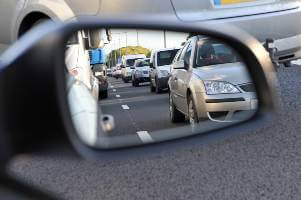 No matter how well you adjust your rear and side view mirrors, you will probably still have blind spots you cannot see in the mirror. That is why it is so important to check your blind spots before changing lanes or merging.
No matter how well you adjust your rear and side view mirrors, you will probably still have blind spots you cannot see in the mirror. That is why it is so important to check your blind spots before changing lanes or merging.
Even though it is a bad idea to hang out in a blind spot, drivers do it all the time. If you do not check before changing lanes, you could cause a serious crash.
While the driver who hits the car in the blind spot is usually found at fault, there may be certain scenarios where the driver of the car that was hit may bear some amount of fault. Below, learn more about liability for these crashes and how to watch your blind spots.
Victims of car crashes should strongly consider seeking experienced legal representation. It can be difficult to recover full compensation for damages on your own. Schmidt Kramer has been representing car crash victims for decades and we have a proven track record.
Why Do Blind-Spot Crashes Happen?
A blind spot is an area you cannot see in your mirrors while you are driving. Another car, bicyclist, motorcyclist or pedestrian could be in that spot, which is why it is important to check your blind spots before making lane changes or merging.
Typically, the larger the car, the bigger the blind spot. That is why those driving large trucks or SUVs need to be particularly careful. However, everyone needs to use caution to avoid a blind-spot crash.
Blind-spot crashes typically happen when one car changes lanes. The driver does not check his or her blind spot and sideswipes the vehicle in the lane he or she is moving into.
Blind-spot crashes can also happen when vehicles are merging into one lane. The driver who is merging may violate the right of way of the other driver and cause a crash. It is important to note the driver in the lane you are attempting to merge into has the right of way.
It is important to be courteous to that driver and not try to cut him or her off. If you are already in the lane another driver is trying to merge into, being courteous can make things much safer.
Blind-spot crashes may also happen when one vehicle is backing up out of a parking space. It can be difficult to see everything behind you when backing up, and you might hit something that is in a blind spot. If this happens, you are likely at fault, unless the other driver was speeding or could have easily stopped before trying to move past you.
Fault for These Collisions
Other drivers have the right to share the road with you, provided they maintain the integrity of their lane. Cutting another driver off is dangerous and could lead to a serious crash. That is why the driver in the lane you are moving into is typically not at fault for a blind-spot crash.
However, every accident is unique. If you checked your blind spot and began to change lanes only to crash into a speeding driver, or one who changed lanes at the same time you did, you may not be the only one at fault. If an accident was partially caused by another driver who failed to use his or her turn signal before changing lanes, he or she might be partially at fault.
An investigation will be needed to assess fault for the crash. It is important to determine what both drivers were doing in the moments leading up to the crash and if they could have done things to avoid a collision.
If you were the one in the blind spot who got hit, proving fault should be relatively simple, unless you were negligent. If you were in the car that hit the car in the blind spot, you can still file a claim with your personal injury protection insurance. However, if your damages exceed the value of this insurance, you may not be able to file a claim against the other driver’s liability insurance. In a liability insurance claim, you must prove the other driver is at fault.
Staying Out of Blind Spots
Whenever possible, make sure to stay out of other vehicles’ blind spots. Many drivers do not pay attention before changing lanes and it can result in a dangerous crash. Either slow down, speed up (without exceeding the speed limit), or change lanes to get out another driver’s blind spot.
Make sure to check your blind spots before changing lanes. You may have checked your mirrors seconds earlier, but you never know when another car could come into your blind spot.
Schedule Your Free Consultation Today
Need assistance after a car crash?
Schmidt Kramer is here to help. Our Harrisburg vehicle accident lawyers have extensive knowledge of the legal process because we have been helping crash victims for more than 30 years.
An initial consultation is free of charge and there is no obligation to take legal action. There are no upfront fees for our service either.
Call Schmidt Kramer today for assistance. (717) 727-2669

